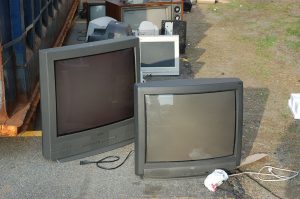
ATR’s facility in Grand Rapids, Mich. Photo courtesy of ATR.
An ITAD company’s growth in Michigan shows how partnering with nonprofit social service groups can present solid business-building opportunities.
E-Scrap News magazine is the premier trade journal for electronics recycling and refurbishment experts. It offers updates on the latest equipment and technology, details trends in electronics recycling legislation, highlights the work of innovative processors, and covers all the other critical industry news.
Sign up for our free weekly e-newsletters to receive the latest news directly.

ATR’s facility in Grand Rapids, Mich. Photo courtesy of ATR.
An ITAD company’s growth in Michigan shows how partnering with nonprofit social service groups can present solid business-building opportunities.

Credit: Travel mania/Shutterstock
CRT management concerns and the latest details on an e-scrap export tracking project both drew the interest of readers last month.

Credit: sirtravelalot/Shutterstock
An e-scrap company is accusing a Sprint subsidiary of failing to follow through on a supplier contract. The processor is asking for roughly $1.7 million in damages.

Credit: Eric Dykstra
Changes in the end-of-life stream are prompting the oldest state electronics recycling program in the country to rethink its processor payment system.
Adirondack Mobile Shredding of Schroon Lake, N.Y.; MARCO of Fenton, Mo.; MARS of Olympia, Wash.; Pioneer SecureShred of Minneapolis; Rocky Mountain Document Destruction of Salt Lake City; Secure Destruction Service of Birmingham, Ala.; Secure Document Destruction of St. Louis of Columbia, Ill.; Sentry Data Management of Blackshear, Ga.; Shredding Solutions of Carlisle, Pa.; Sims Recycling Solutions of LaVergne, Tenn.; Sims Recycling Solutions of Roseville, Calif.; TITAN Mobile Shredding of Pipersville, Pa. and Without A Trace Mobile Shredding of Scarborough, Maine have either achieved or renewed their NAID certifications for physical destruction of hard drives.
Visit our archive to view previous editions of the scorecard.
 This story has been updated
This story has been updated
A new waste management plan in the Netherlands has forced Jansen Recycling, a Dutch outlet for U.S. CRT glass, to discontinue accepting material from its suppliers.

Credit: NothingIsEverything/Shutterstock
Legislation advancing in the state of Washington bans the sale of electronics with permanently affixed or otherwise difficult-to-remove batteries.

Credit: Nerijus Juras/Shutterstock
A North American recycling operation will open an e-plastics-focused facility in response to Chinese import restrictions.

Credit: Joao Estevao A. de Freitas
The value of recovered circuit boards has risen in recent months, much to the delight of e-scrap reclaimers.

Credit: WEEE Ireland
An IT asset disposition company has received a high-profile Circulars award from the World Economic Forum. The recognition comes as Apto Solutions prepares to launch a new device-leasing program.

